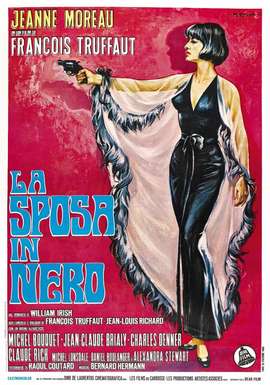Though Jeanne Moreau is top-billed in The Bride Wore Black (1968), it takes a good 15 minutes to figure who the hell the film is about. Two douchey bachelors, one about to wed, discuss their various female conquests the way hunters compare trophy animals. Then there’s the wedding, which Moreau’s enigmatic Julie crashes, and where the new husband experiences an abrupt change in marital fortune. Adapting the crime novel by Cornell Woolrich, François Truffaut proceeds through two murders before, in flashback, Julie’s exact mission is explained. Her five targets grant Moreau a chance to play five different roles, since each is an imposter seeking to get close to the intended. She is by turns a schoolteacher, a tramp, an artist’s model, and so forth. You can’t say that Bride is a particularly personal film for Truffaut (or Moreau), but each chapter offers the chance to savor how each successive d-bag is lured and skewered, as it were, by an instrument of vengeance. With four decades’ distance, Bride satisfies by siding so firmly with Julie against these self-satisfied playboys (politician, artist, mobster, etc.). It’s very much a ’60s film, but French male sexism is obviously more entrenched, and unchanging, than the so-called sexual revolution. Julie is, in a way, an avatar of true love, a wronged woman determined to do right—but by killing for the sake of honor in a corrupt new world. (NR) BRIAN MILLER
Nov. 25-Dec. 1, 7 & 9:15 p.m., 2011




